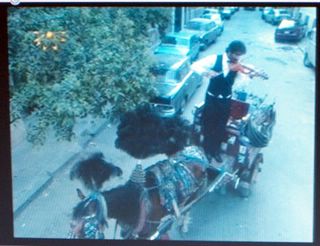
Scene from Spotlight
There are various ways and methods to learn the local dialect here in Syria. One of the best resources is located at
There is another way. One of the best ways to learn a language is using what some linguists call realia, which means using real news articles, radio broadcasts, films etc. I am not writing anything new here. I do, however, have a few suggestions for anyone who really wants to learn Syrian Arabic by using some fun Syrian realia. I had a friend who learned lots of Syrian Arabic from listening to radio programs. That is great, but such shows are often performed in a style of speech that is entertaining to listen to, but not very educated –sounding in real life. Don’t get me wrong, these are great – but people will laugh at you (as they did at my friend) if you speak exclusively like the people on the radio broadcasts.
There is a great Syrian Ramadan television series called SPOTLIGHT (Arabic – buqa’at Dau). During Ramadan, Spotlight is shown in the evening during the primetime television hours on the Syrian satellite channel. Each night, two or three episodes are shown, each lasting from about 5 minutes to an hour. Each episode is chock-full of high frequency greetings, phrases, and vocabulary. The most recent season, 2004, was the fourth season of the series. You can purchase complete seasons from many CD vendors for anywhere from 10 – 40 dollars. Look around before buying. Also, they are all in the format of VCDs.
Spotlight is a political and social satire. I should also mention that it is usually hilarious. My favorite actor is Basam Yakhour, who reminds me of my little brother. The humor is typically understandable to a western audience. This is not like the terrible (a’dam almuakhza) Egyptian movies.
What to do
Here is how I suggest using Spotlight to learn Syrian Arabic. You can easily adjust these suggestions according to your own ability and goals.
1) View a few episodes and choose one that looks interesting to you.
2) Watch the episode a few times yourself and see how much you can understand. Write down notes and questions.
3) Find a Syrian. Watch the episode through completely with them.
4) Have the Syrian ask you what you generally understood.
5) Watch it again with the Syrian and have them write down commonly used expressions and vocabulary.
6) Discuss the episode and build on your understanding.
7) Write down new phrases and vocabulary.
8) Practice these in various sentences with your Syrian friend.
9) Memorize them!
10) Use them in speech! Be clever and find a way to use them in your daily conversations with Syrians.
For those who want to go more in-depth…
11) Go through the episode scene-by-scene, or even sentence-by-sentence with the Syrian.
12) Write down what they are saying word for word. This takes lots of time, but it is really useful for learning. Try it and you will see. The more you do this, the easier it is and the better your Arabic becomes. This will help you with vocabulary and expressions, but also with understanding Syrian sentence structure – SYNTAX! This is extremely important. Speak like a Syrian, instead of simply translating your native language into Arabic.
13) Discuss new vocabulary and expressions in similar and different contexts from what is in the episode.
14) Memorize these expressions and vocabularies.
15) Use them in speech as often as possible so that they become solidified.
16) You may want to wait a day or two and then it’s on to the next episode. Doing this over and over will really improve your Arabic. You will find that yes, there are an abundance of expressions in Arabic, but hey, they are being repeated over and over.
Syrians will warm up to you if you use clever expressions in a suitable context and manner. This is one of the best ways I know to really learn the local dialect. Sure, you can learn a great deal by sitting around and visiting with Syrians, drinking tea etc., but if they know you are a foreigner, they will likely not diversify their speech with you. They will use simple Arabic – the stuff you hear from everyone. You need to listen to them speaking to each other and be able to rewind and discuss specific vocabulary and expressions. This is the beauty of SPOTLIGHT. OK, it is all scripted dialogue, but it is very rich in lexical breadth as well as accurate in usage and practice.
No comments:
Post a Comment